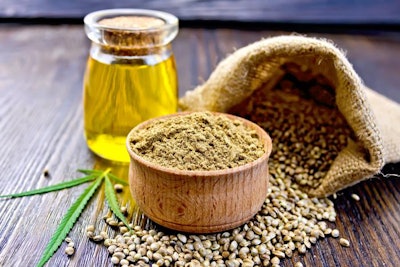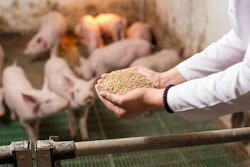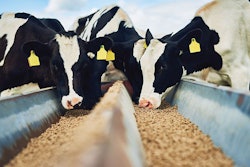
Federal agency issues 15 warning letters, consumer guidance after prohibiting use of CBD in animal feed
The U.S. Food and Drug Administration has declined an application that sought to approve the use of CBD in animal feed, saying “it cannot conclude that CBD is generally recognized as safe (GRAS) among qualified experts for its use in human or animal food.”
The agency issued warning letters last week to 15 companies regulators claim illegally incorporated CBD, an oil derived from hemp, into food products, including livestock feed. It also updated a consumer guidance document on sale and use of CDB to say the agency “has seen only limited data about CBD safety, and these data point to real risks that need to be considered before taking CBD for any reason.” The document outlines concerns about the potential for liver injury, damage to male reproductive organs, and potential interactions with alcohol or other drugs.
A spokesperson for the FDA declined to answer further questions, but said the agency “will have more to say on CBD in the coming weeks.”
Bill Bookout, president of the National Animal Supplement Council, said the council currently supports the FDA’s actions, but that the industry’s ongoing reaction will depend on how further action from the agency unfolds.
Thirteen of the 15 companies that received warning letters this week were marketing products for animal consumption, and all had made drug claims purporting the product could diagnose, prevent or cure disease — a practice Bookout said has long given the animal supplement industry a black eye.
“They’re breaking the law,” he said. “They shouldn’t even be in the industry.”
It was also clear during hearings in May, Bookout said, that the industry had not made a strong case that CBD should have GRAS status as food, which requires evidence that the ingredient offers some nutritional, aromatic, or other consumptive benefit to food. Instead, the popularity of CBD is primarily driven in consumer belief that CBD oil may treat anxiety or relieve discomfort.
But while the FDA has been consistent in stating that CBD is not an approved food ingredient for humans or animals, their enforcement of this rule has waned in the last two years, enabling a billion-dollar industry to evolve, Bookout said.
The growth of CBD-based products for pets has been especially rapid, he said. While trends in animal food tend to follow trends in the human market, he said, demand for CBD in pet food has “followed for CBD more rapidly than any ingredient I have ever seen.”
The FDA, Bookout said, has allowed this rapid expansion by failing to take action against the companies that produce these products. At this point, he said, it’s too late for the agency to “put the toothpaste back in the tube.”
“If FDA removes all products with CBD from the market, without some reasonable parameters, that would be a significant problem” that he thinks would trigger intense backlash from the pet supplement industry and from the public, he said. “The travesty is, like it or not, if FDA comes out with actions that are too restrictive…people are going to go out to a recreational state and get a tincture, and they’re going to self-diagnose, self-treat, and wind up hurting the exact animals they say they’re taking this action with the intent of protecting.”
Though it’s currently unclear how the FDA’s guidance on CBD in animal products will evolve, Bookout said it was the opinion of the supplement council that CBD does not pose undue risk to dogs, cats or horses. However, the council does support the agency’s position of disallowing the CBD for production animals.
Industry groups are also pursuing approval for hemp seed oil for dogs and cats, and hemp-derived protein powder, both of which Bookout said have a strong chance of succeeding. He said the approval of hemp seed oil, which can be used as a source of omega-3 in animal diets, could come as early as the first or second quarter of 2020.
In the interim, the supplement council is advising manufacturers that cannabis in any form should not be used in animal food.














